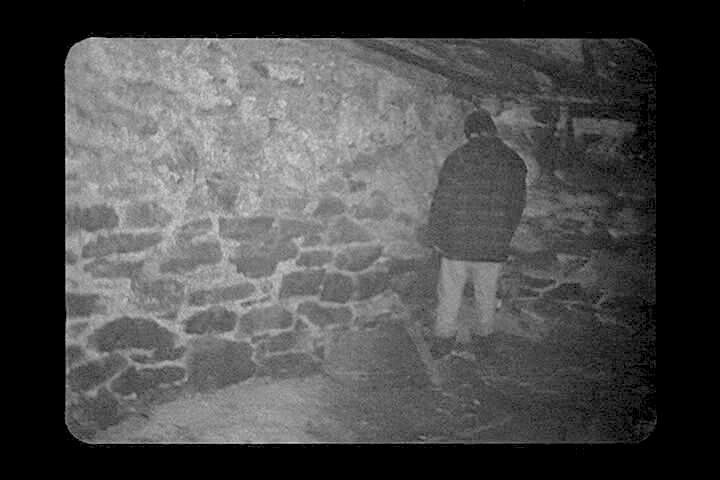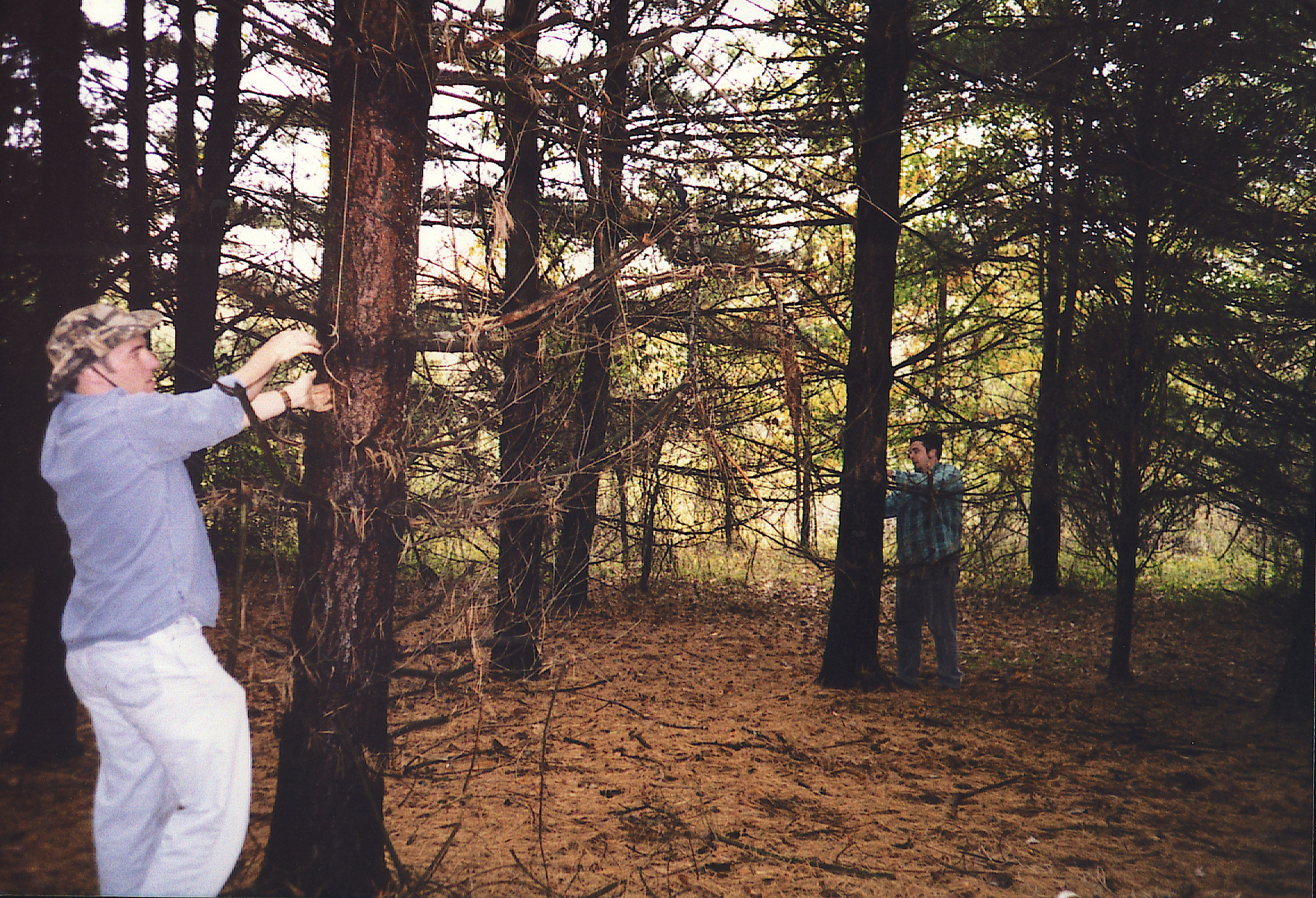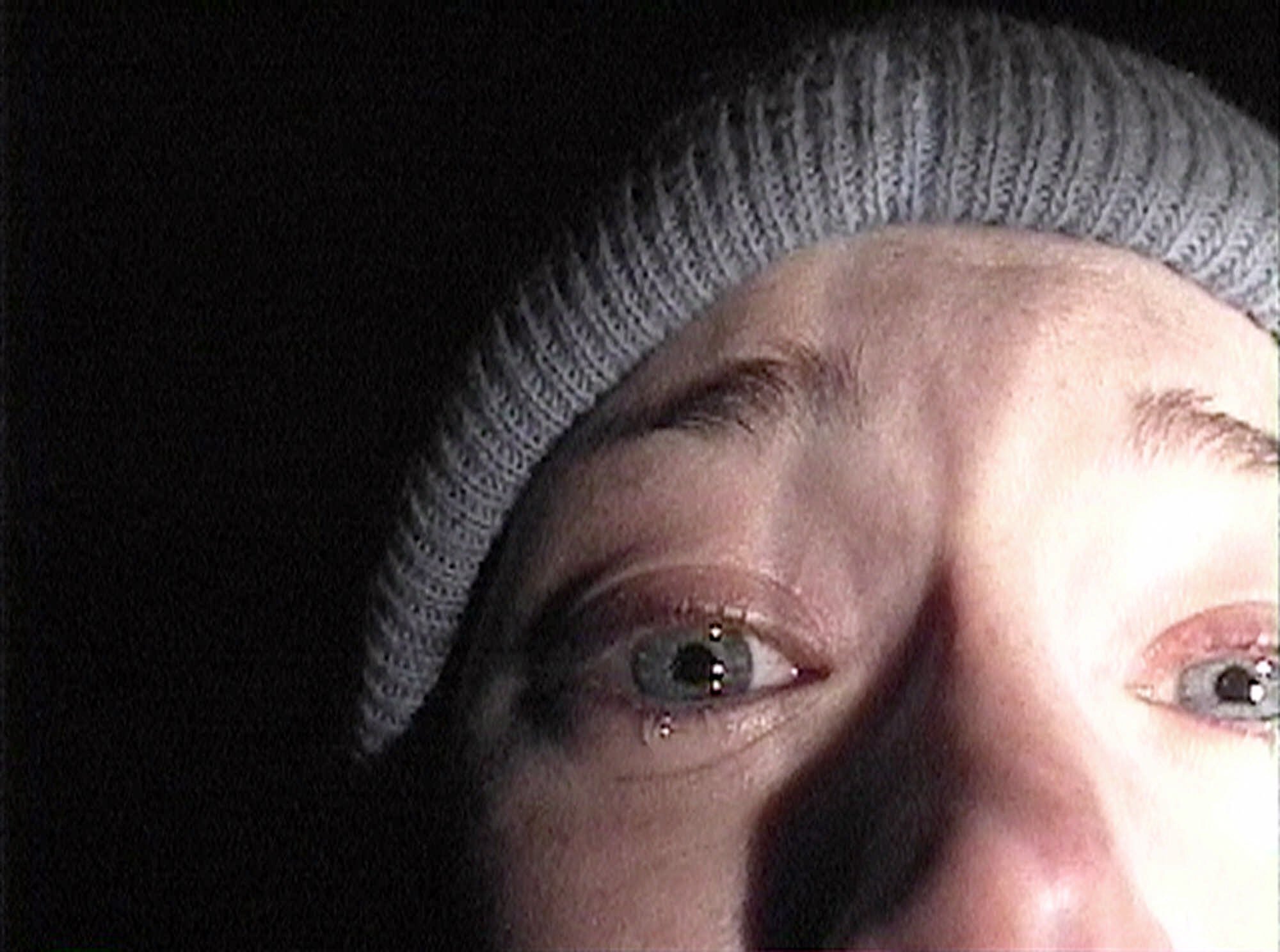The Blair Witch Project: An oral history, Part 2
The second chapter in a four-part series


A free daily email with the biggest news stories of the day – and the best features from TheWeek.com
You are now subscribed
Your newsletter sign-up was successful
In October 1997, two unknown, first-time filmmakers shot a micro-budget horror movie in the woods in Maryland. Their success was extraordinary: The Blair Witch Project became a $248 million global phenomenon. Along the way, the filmmakers revolutionized the idea of a "blockbuster," proved the value of viral marketing, and launched an entire subgenre of cinematic horror.
Nearly two decades later, how do the people responsible for The Blair Witch Project feel about the film? In the following four-part oral history, six people involved in the creation of The Blair Witch Project — writers/directors Dan Myrick and Eduardo Sanchez, producer Gregg Hale, and stars Heather Donahue, Joshua Leonard, and Michael C. Williams — describe in their own words the instrumental roles they played in bringing one of the most successful and influential horror films of all time to life.
The Week
Escape your echo chamber. Get the facts behind the news, plus analysis from multiple perspectives.

Sign up for The Week's Free Newsletters
From our morning news briefing to a weekly Good News Newsletter, get the best of The Week delivered directly to your inbox.
From our morning news briefing to a weekly Good News Newsletter, get the best of The Week delivered directly to your inbox.
Part II: Shooting The Blair Witch Project
With the three stars cast, the creative team behind The Blair Witch Project prepared for a short, grueling shoot in Maryland's Seneca Creek State Park.
Eduardo Sanchez (writer/director): We told [the actors] very little. It was mostly about trying to give them the information that they absolutely needed, but keeping everything as secret as possible.
Dan Myrick (writer/director): Obviously, they knew they were in a movie. We had a pretty detailed plan with our producer, Gregg Hale — a safety plan, because we had all the locations in the woods mapped out: the direction we wanted them to walk, and the overall game plan of how we were going to shoot the film.
A free daily email with the biggest news stories of the day – and the best features from TheWeek.com
Gregg Hale (producer): I had been through survival school when I was in the army, and that inspired me to run the actors through a kind of "storytelling survival school" obstacle course. We gave them GPSes in the woods, and ran them through a series of things that would happen to them. But they didn't know what was going to happen to them, and we would just allow them to record their reactions to the stuff that was happening to them.
Dan Myrick: Story-wise, we wanted to keep as "method" as we could. We gave Heather most of the background on the Blair Witch mythology we created, which would be the case in real life. She'd be the one who would know the most about it, and where the locations are. We wanted her film crew to be asking questions as they normally would, and they were encouraged to do so. "What is this Blair thing about?" All the exposition gets to come out on screen very naturally.

The filmmakers engineered an elaborate plan to immerse the actors in the world of the Blair Witch in the weeks leading up to the eight-day shoot.
Joshua Leonard (actor, "Josh"): It wasn't until everybody got cast, and we were a couple weeks out from filming, that stuff became more real. We started getting these faux flyers in the mail for local events that were happening in Burkittsville, and started getting more in-depth character information that the guys had come up with.
Heather Donahue (actress, "Heather"): I knew that Mike's character was the sound guy, Josh's character was the camera guy, and I knew that my character was the director. I wrote that whole piece in the cemetery — all those bits where my character's reading the narration for her documentary. I did research on all kinds of symbolic symbols, and Wicca, and how to stay alive in the woods. I did a very good job of freaking myself out as best I could before we even got there.
Michael C. Williams (actor, "Michael"): All they told me was that they wanted me to be the one that was more scared. They didn't tell me anything. They didn't want me to change who I was. The whole idea was to be as close to yourself as possible.
In an attempt to direct the actors while allowing them freedom to improvise, the filmmaking team used GPS to lead them to a series of film canisters, which contained their instructions for the day.
Heather Donahue: Each of [the film canisters] would have our initials on them. We would read the instructions for that scene, and each of those instructions was in conflict with each other. So that basically provided the skeleton of what the conflict was, and then we were free to fill that out however we liked.
Eduardo Sanchez: A lot of times we'd kind of play them against each other and just kind of try to build tension. Like, "Heather knows more. Heather is not telling the truth about all this stuff."
Gregg Hale: We were out in the woods, but [the actors] didn't know it. We were camouflaged, and we built little hiding places where we could be close to them and see them. We were out there, but they really weren't aware we were out there.
Dan Myrick: The mandate: Shoot everything, react naturally, give us lots of screaming and yelling, and then run in this direction, and stop when you see the stake.
Eduardo Sanchez: We would collect the footage two or three times a day, but we had very little time to watch it, because it was a 24-hour-a-day shoot. Basically, it was sleeping, or out doing the movie stuff, which included logistical stuff: getting them the right food, and camera, and batteries, and just all the technical stuff, as well as directing duties.
Michael C. Williams: [The filmmakers] gave us this "stage" that was completely believable, because we were actually in the woods, and actually sleeping in tents, and actually eating less and less food. Obviously we had to use our imaginations: We knew that there were directors, and they were messing with us in the woods. But you had to believe in your mind that it wasn't them. That it was something else.
Heather Donahue: We didn't have to skin squirrels or anything. It was kind of a daily-use park. We had to stop shooting for families going past on their bikes.
Though they were encouraged to remain in character, the actors quickly discovered that they needed to develop a system to communicate with one another when the cameras were off.
Michael C. Williams: In the beginning, it was confusing, because we needed to set some boundaries as to when we were acting and when we were not. And the directors did not establish that for us; they wanted us in character as much as possible. So at one point we decided, as actors, that we needed code words to break from being an actor to being who we actually are. […] We chose, "Taco." If you said "Taco," the other two actors had to repeat the word "taco," so I knew, and they knew, we were all out of character at the same time. We would say "taco," "taco," "taco." "Hey Mike, I think you should try this. I think it was a little unbelievable the way you screamed there."
Heather Donahue: We would just agree we were going to shoot a scene in a particular spot about a basic thing, and then we'd say, "Well, alright. Let's go." It was very, very simple.
Joshua Leonard: Our job was to make a documentary. So that was really what we were doing, and everything else… it became a hybrid, as I think it always does, between playing these kids from Montgomery College, and — because we were young, and not experienced improvisers — we also wound up pulling a lot from our own lives.
Heather Donahue: The three of us collaborated on that all the time. Josh would decide he wants to do a scene about swinging from a tree. And so were we all like, "Are we down with that? Sure, alright, let's shoot it."
Eduardo Sanchez: Every once in a while I would go out there and talk to [the actors]. Sometimes, it was kind of planned — it was about character stuff. Sometimes they just needed a pat on the back, or to hear what was wrong, or to voice their complaints about the other actors. But for the most part we tried to leave them completely alone and isolated.
Michael C. Williams: Everyone is looking to hear that we all couldn't stand each other, but that just wasn't the case. It seems like it on film, but we were fine. Once we were out of character, we were fine.
Though the filmmakers and actors alike stuck to the basic beats of the story, they were willing to take things in a new direction as the shoot progressed.
Joshua Leonard: I do remember, at one point, that the character of Heather and I were supposed to have some kind of previous romantic entanglement — and by the time we got around to shooting, that was tossed out the window.
Eduardo Sanchez: After we started to shoot we realized that Heather and Josh were fighting a lot. Like, annoyingly a lot. Just distractingly too much. So, Dan and I made the call of pulling Josh out instead of Mike. Everyone expected Mike to be pulled out. That was the biggest curveball that we threw at them.
Joshua Leonard: That day, my note said, "When everybody goes to bed tonight, stay awake, and once you're sure they're asleep, leave the tent. If anybody wakes up, tell them you're going to take a piss." That's all I knew. I just waited until they fell asleep, got up, and walked out of the tent. Ed and Dan and Gregg and maybe [production designer] Ben Rock were there, waiting for me with flashlights. And they said, "You're dead, dude," and they took me out to a really nice meal at Denny's.
Heather Donahue improvised the entirety of her "I'm so scared" speech, which became the film's most iconic — and widely parodied — moment.

Heather Donahue: I think my note was something like, "You realize now that you're going to die. Say what you need to say to make amends." […] It's funny when people are like, "Oh, it was just real." No, we were actually in a car that day, and we drove for an hour or so [to a new location], so I kind of had to goose myself a little bit. I was so proud of that moment, because it's everything you're not supposed to do as a film actress. The snot was flowing, and it was unflattering, and it was just true, and ugly, and messy, and sloppy. And I don't think people get to see that kind of thing very often. A real good ugly cry on screen.
The film draws to a close as Heather and Michael stumble upon an abandoned house in the woods, with grim endings for both characters.
Eduardo Sanchez: We finished on Halloween night. We were planning on finishing up the day before, but the camera ran out of batteries — the camera light, which was the bane of our existence.
Dan Myrick: The initial reveal of the house was completely natural. We had them camped out just outside the perimeter of the house. We told them to get up and head in this direction. Their reaction to this house in the woods is purely spontaneous. They weren't aware they were coming upon a house. We made our best attempt to guide them through: prepped the house, blocked the entrances except for one, and had radios of Josh's voice strategically placed inside the house to guide them through as much as we could. But we knew, out of pure reality, that they weren't going to go through the entire choreography we wanted on the first take. We got them as far as we could into the house and shouted "Cut!"
As the shoot wrapped, the actors and filmmakers celebrated and parted ways.
Michael C. Williams: It was kind of cool coming out of the woods [on Halloween] and being surrounded by people in costumes. It was very surreal. You were exhausted; you had just come through this guerilla filmmaking, emotionally draining experience. And you're just hungry. And you want to go eat. And you go to Denny's, and there's a bunch of witches and warlocks running around.
Heather Donahue: That was it. I mean, there was nothing to celebrate. It was just this little indie that we shot. It didn't really feel like a big deal.
Dan Myrick: The actors were exhausted, we were exhausted, and we were out like a light for a while. Like most things you shoot, it was a huge relief. We had a ton of footage to look at, and we were liking what we were seeing, and feeling pretty encouraged about the footage we were getting back. But it was still at its infancy, conceptually, whether this was going to work or not.
Eduardo Sanchez: Even if the movie hadn't done anything, we knew that we would probably never do a movie like this ever again. We also celebrated the fact that we didn't kill anybody. [laughs]
Dan Myrick: You just don't have the resources to overcome someone twisting their ankle on a shoot like that. We were pretty amazed that everybody came through unscathed.
Eduardo Sanchez: I was walking back, with Gregg or Dan or somebody, in the middle of the night. And I said, "We're nobodies. We have no track record. But we're doing something right now that Spielberg could probably never do." We were just breaking so many rules. We were really taking a chance on an experimental film — but we had nothing to lose, and we had everything to gain. We were like, "We don't have anything, but we really are doing something here that arguably one of the greatest filmmakers that ever lived will never probably experience." It was the only thing we had — we were broke, we had no money — but we were like, "At least we're doing something unique."
Coming in Part III: After months in the editing room, The Blair Witch Project gets a splashy premiere at the Sundance Film Festival — and Blair-mania quickly overtakes the country.
Scott Meslow is the entertainment editor for TheWeek.com. He has written about film and television at publications including The Atlantic, POLITICO Magazine, and Vulture.
-
 How to Get to Heaven from Belfast: a ‘highly entertaining ride’
How to Get to Heaven from Belfast: a ‘highly entertaining ride’The Week Recommends Mystery-comedy from the creator of Derry Girls should be ‘your new binge-watch’
-
 The 8 best TV shows of the 1960s
The 8 best TV shows of the 1960sThe standout shows of this decade take viewers from outer space to the Wild West
-
 Microdramas are booming
Microdramas are boomingUnder the radar Scroll to watch a whole movie
